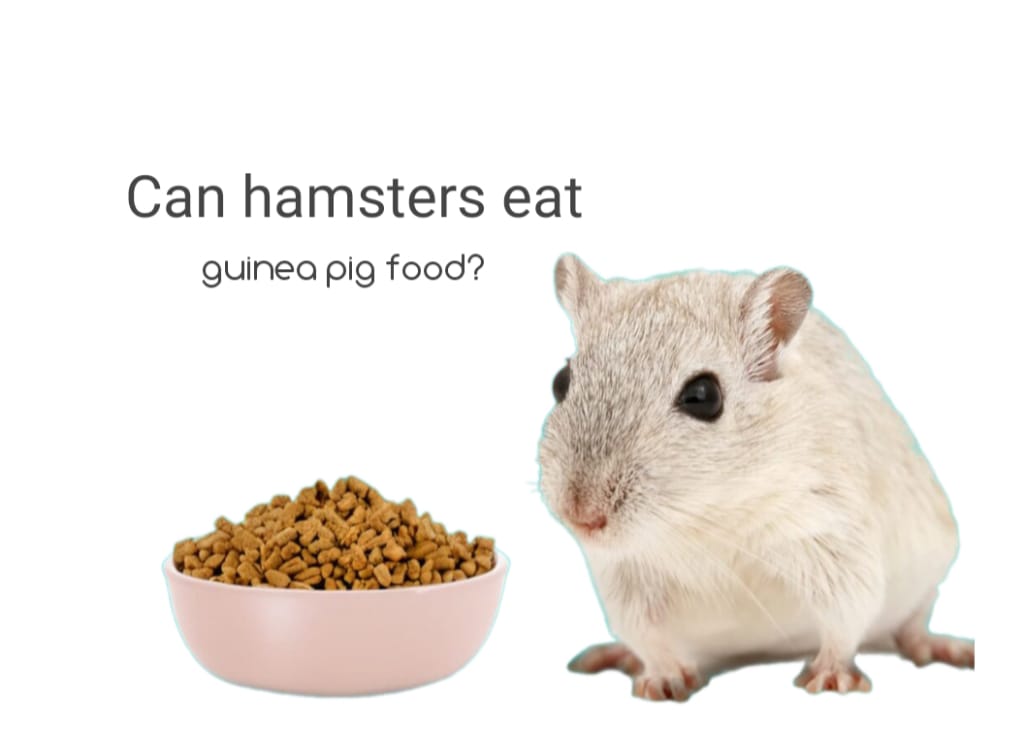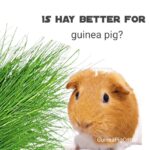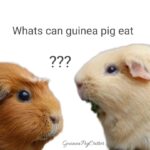Two popular pets the hamsters and guinea pigs are both very small, look adorable and easy to keep. However, on a point of their dietary requirements, the two species differ significantly.
On this blog post, we will look at whether or not hamsters can eat guinea pig food, potential risks involved in doing so and how best to feed your pet to ensure its healthy living.
Read this :-Can guinea pigs and humans live together?
Needs Of Hamsters And Guinea Pigs
Hamsters:
Omnivorous Diet: Hamster is an omnivore which means it eats both plant and animal matter; typically seeds, grains, fruits, vegetables but occasionally insects or other sources of protein.
Protein: Proteins form an important part of a hamster’s diet; they help in growth , repair and overall health. This can be from animal sources like mealworms or high-protein seeds and nuts.
Fiber: Although hamsters also require fiber for digestion but not as much as guinea pigs do. Seeds grains some vegetables provide fiber in a hamster’s diet.
Vitamins and Minerals: A complete diet provides all essential minerals and vitamins that are needed by the body with regard to maintaining a good mixture of different nutrients.
Guinea Pigs
Guinea Pigs are Herbivores: Their diet is entirely made up of plant material primarily composed of hay, fresh vegetables and specialized pellets.
Vitamin C: For guinea pigs, vitamin C is not synthesized by the body as in hamsters and thus becomes a crucial dietary requirement to avoid scurvy.
Fiber: To maintain proper digestive function and oral health, Guinea pigs need high fiber content. Additionally, hay provides much fiber which should be always accessible.
Pellets: Such pellets are specially designed for guinea pig feeding with additional inclusion of Vitamin C.
Can Hamsters Eat Guinea Pig Food?
Feeding hamsters with this food will not kill them immediately but it is still not advisable due to:
Nutritional Imbalance: This animal feed lacks animal protein that hamster needs because it is specifically formulated for herbivorous animals such as guinea pigs.
Vitamin C Content: While this nutrient is important for guinea pigs, it is not as necessary for hamsters. A lot of vitamin C does not harm hamsters but also adds no value to their bodies.
Digestive Differences: In contrast from guinea pigs who largely eat grasses, these omnivores have different digestive systems which require equal protein-fat-carbohydrate ratios that cannot be found in guinea pig food.
Obesity Risk of Guinea Pig Pellets could have different caloric contents and cause obesity in hamsters if given excessively.
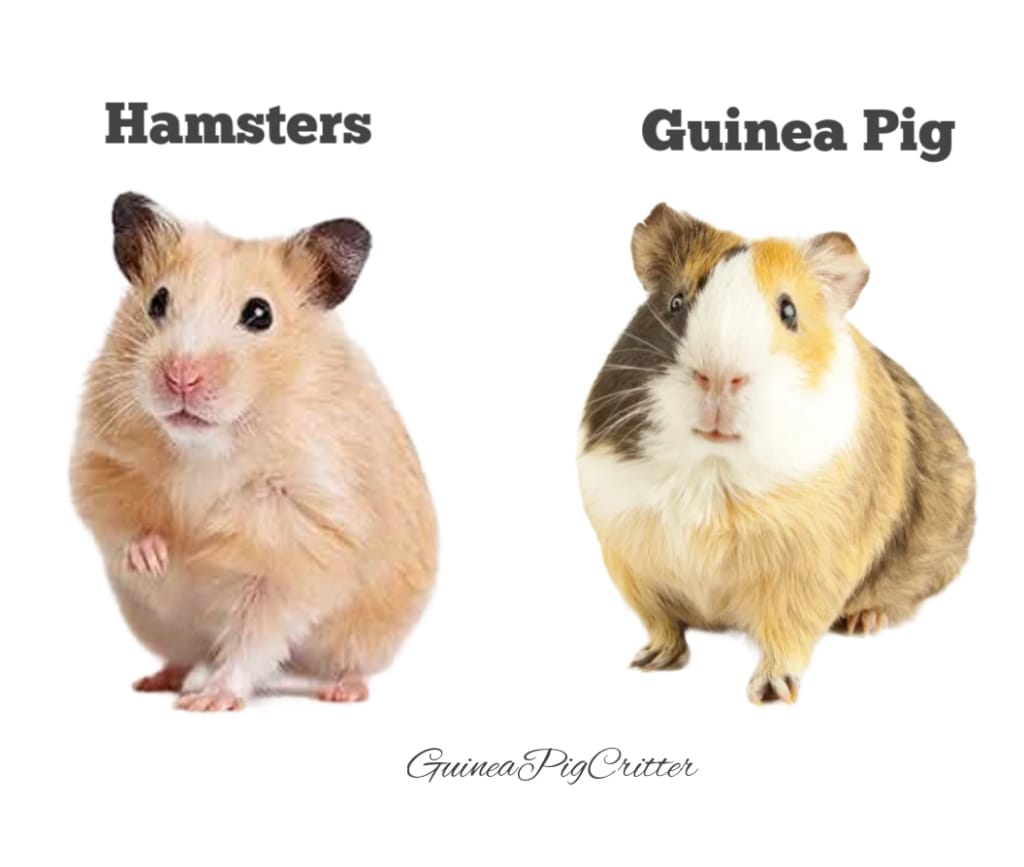
Potential Risks of Feeding Hamsters Guinea Pig Food
Feeding your hamster guinea pig food regularly can pose several risks:
Nutritional Deficiencies: When a hamster doesn’t receive enough animal protein, it may suffer from nutritional deficiencies that can change its growth, health, and lifespan.
Digestive Issues: A high-fiber low-protein diet leads to digestive problems among hamsters like diarrhea and upset stomach.
Dental Health Problems: Guinea pigs should be provided with various feeds needed for them to develop strong teeth. The texture and variety required for good dental health might not be provided by guinea pig food.
Overall Health Decline: If the diet does not suit the requirements of a hamster, such animals can experience general health impairment including weak immune system and reduced vigor.
Best Practices for Feeding Hamsters
To ensure the health and well-being of your hamster, it’s important to provide a balanced diet that meets their specific needs:
Primary Diet:
Commercial Hamster Food: High-quality hamster pellets or mixes should form the bulk of their diet. These are specially formulated to provide a balanced mix of nutrients.
Fresh Fruits and Vegetables: Give them little amounts of fresh fruits and vegetables every day. Good choices are apples, carrots, broccoli or spinach. Keep away from citrus fruits and anything hamsters can eat that may be toxic.
Protein Sources: You should supplement their diet with protein-rich foods such as boiled eggs, mealworms, small pieces of cooked chicken.
Treats and Supplements:
Seeds and Nuts: Treat seeds and nuts cautiously for fat content is high thus making it a cause of obesity if overdone.
Chew Toys: Provide toys to chew on as well as blocks to help maintain dental health.
Water:
Fresh Water: Make sure there is always fresh clean water in the cage at all times. Change it daily so it remains clean and free from contaminants.
Nutritional Components: A Closer Look
Protein Needs:
Hamsters need a higher level of protein compared to guinea pigs. In order for them to grow properly, build their muscles and stay healthy; hamsters need proteins. Mealworms, crickets, boiled eggs or very little cooked chicken/turkey can be considered good sources of these proteins by a hamster breeder.
Fiber Needs:
Although both species demand fiber hamsters require less than guinea pigs do. So the fiber that will make up mostly the diet of a Guinean pig comes from grains seeds as well as some vegetables but not the high fiber hay that guinea pigs consume that forms the greater part of Hamster diet fiber.
Vitamins and minerals:
A balanced meal ensures that vitamins and minerals are attained. For their growth, hamsters need diverse diets that include different kinds of seeds, cereals, fruits and vegetables.
Tips for mixing pets in the same household
If you own guinea pigs and hamsters at home, feeding them right is difficult but very important:
Keep Feeding Areas Separate: There should be one feeding area for each pet to avoid interference with its food by other animals.
Monitor Their Meals: If the feeding time overlaps, observe them while they eat so as to ensure that they consume what is meant for them only.
Tailor custom diet plans: Vets can help you develop proper eating habits for each pet depending on its peculiar needs.
What to do if a Hamster Eats Guinea Pig Food
The accidental consumption of a guinea pig’s food is not usually a cause for alarm among hamsters. Nonetheless, watch your hamster closely after he has eaten this food. Let your vet know if you see any signs of concern including fatigue or irregular movements. In case there are symptoms like tiredness, diarrhea or no appetite seek advice from your veterinary officer instantly.
Popular Misunderstandings About Hamster And Guinea Pig Diets
Most people who keep these animals have wrong ideas about how they should feed them. Therefore let us consider some of the popular misconceptions around this matter.
Myth: Hamsters and guinea pigs can eat the same food.
Reality: While they can share some fresh vegetables, their pellet requirements differ due to their unique nutritional needs.
Myth: All pellets are created equal.
Reality: Hamster and guinea pig pellets are specifically formulated for their respective species. Feeding the wrong type can lead to health issues.
Myth: Fresh vegetables are not necessary if pellets are provided.
Reality: Fresh vegetables are crucial for both hamsters and guinea pigs to provide essential nutrients and hydration.
Myth: Vitamin supplements are optional.
Reality: Guinea pigs require vitamin C supplements either through their diet or fortified pellets, while hamsters do not.
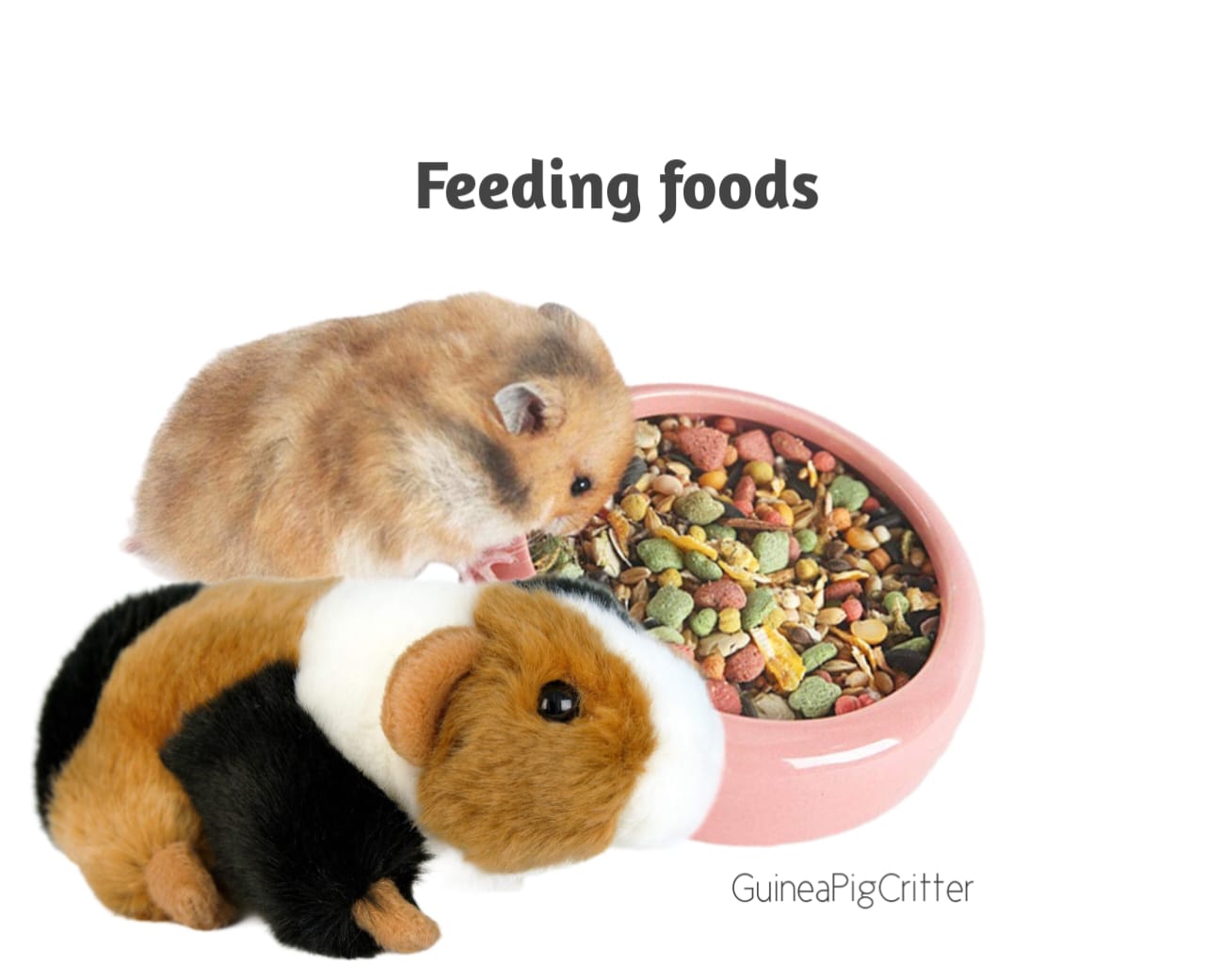
The Importance of Species-Specific Diets
Feeding your pets a diet tailored to their species is essential for their health and longevity. Here’s why:
Prevent Nutritional Deficiencies; Species-Specific Diets Make Sure That Your Pets Get all the Essential Nutrients They Need to Thrive.
Maintain Digestive Health; Proper Fiber Intake Is Important for the Digestive Health of Both Hamsters and Guinea Pigs. The Right Kind of Hay And The Correct Ratio Of Pellets To Fresh Produce Help Prevent Digestive Problems
Support Overall Health; A Balanced Diet Promotes Overall Health, Including A Strong Immune System, Healthy Teeth And Shiny Coat
Practical Feeding Tips
Read these tips and learn how to feed your hamsters and guinea pigs properly:
Measure Pellets: To avoid getting overweight and obese, it is important you adhere to the recommended serving sizes.
Introduce New Foods Gradually: When adding new vegetables into their diet, introduce them slowly to prevent stomach upset.
Monitor Weight and Health: Regularly check your pets’ weight as well as general health. Seek veterinary advice if any changes are observed or concerns arise.
Provide Fresh Water: Ensure that your pets have constant access to fresh drinking water. Check water bottles or bowls daily for refilling.
Read also this :-what is a baby guinea pig called?
Conclusion
While a hamster could sometimes eat guinea pig food without there being any immediate harm, it is not recommended that this becomes part of their regular diet. The nutritional requirements varies between hamsters and guinea pigs because each of them has specifically formulated food pieced together in order to meet their unique needs. If fed the wrong type of food, a number of diseases might develop among them such as malnutrition, indigestion problems amongst other things leading to overall poor health.
Make sure to give your pets food that is appropriate for their species in order to keep them healthy and satisfied. If you have any questions or worries about what they should eat, then request help from a veterinarian who deals with small animals. Such professionals can direct and design a proper diet plan for both hamsters and guinea pigs. When you put their feeding first, your animal friend will live long, happy lives full of health.
